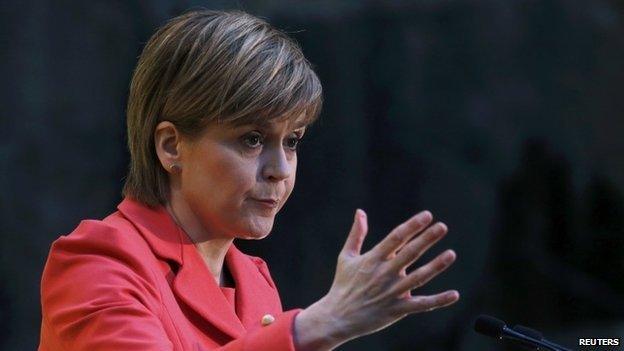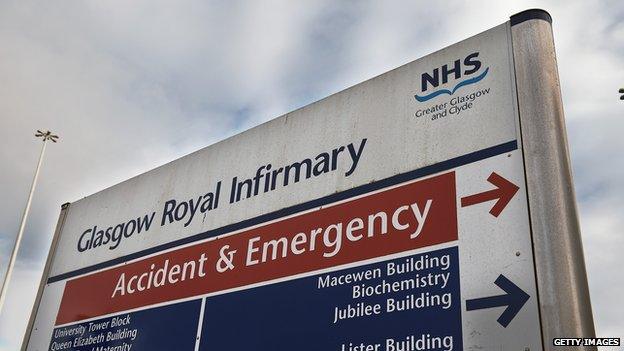Election 2015: The power of the woman who isn't even running
- Published

Something truly extraordinary happened this morning.
A woman who is not even a candidate in this election; whose party is running in just one of the four nations and which, even if it does as spectacularly well as some polls suggest, would have just one in 13 MPs in Westminster pledged to build not just a "stronger Scotland" but a "better and more progressive politics for everyone" in the UK.
Nicola Sturgeon showed once again why she is the undoubted star of this general election campaign and why she says her Inbox is filled with emails from voters from outside Scotland who want the chance to vote SNP.
In a confident performance she declared that an end to austerity was the SNP's number one priority. She spelt out what SNP MPs would back - a mansion tax, a bankers bonus tax and a new 50p top rate of income tax - as well what they would oppose - Trident, the "bedroom tax" and cuts to disability benefits.
Her headline pledge was to vote for an increase in NHS spending bigger than any other party has so far promised - £9.5bn above inflation in England by 2021 which implies a total increase on spending on the NHS in Scotland of £2bn by 2021.
Capital investment
This is very interesting because only last year the independent Institute of Fiscal Studies reported that between 2009-10 and 2015-16 NHS Scotland cut spending by around 1% whereas the Westminster government has increased spending on the English NHS by around 4%. They concluded that "Scottish Governments in Holyrood have placed less priority on funding the NHS in Scotland (and more on funding other services) than governments in Westminster have for England". It's a finding the Scottish Government disputes.

When I put this to the Scottish Government a spokesperson said: "We have met our commitment to increase NHS Scotland's resource budget in real terms every year, and that has seen a 5% real terms increase in the five years to 2015-16. Scotland's frontline health service budget now stands at an all-time record of more than £12bn a year - and funding is higher per head than in the rest of the UK.
"In terms of capital investment in the NHS, the IFS analysis did not take into account the value of our non-profit distributing (NPD) capital investment in the health service. In 2015/16 alone this amounts to more than £380m. When this is taken into account, total health investment in Scotland - encompassing both resource and capital - has increased in cash terms by £1.5bn from 2009/10 to 2015/16. In real terms it has increased by £179m, an increase of 1.5%."
I am still trying to get the bottom of how these two sets of figures can be reconciled. One key reason is that the IFS did not include capital spending in their study.
Uncharacteristic slip
Incidentally, another report - by the Nuffield Trust - found that Scottish governments (both SNP and, before them, Labour) had spent less on health than England between 2000/01 and 2012/13, building up a surplus of about £900m to spend on, for example, free care for the elderly.
One reason for this may be that historically spending on the Scottish NHS has been significantly higher than on the NHS in England, Wales and Northern Ireland. When I interviewed Nicola Sturgeon in January I asked her about the IFS report.
So far there has been a great deal of scrutiny of what the SNP might do if they sweep to victories across Scotland and there is a hung parliament but not very much scrutiny of their detailed policy proposals.
Perhaps now there will be because whether you love the idea of the SNP shaping politics throughout the UK or loathe it there is no doubt that the party's rise is the story of this election so far.
Uncharacteristically, Nicola Sturgeon stumbled ever so slightly just once today when she began to suggest that she would be going to Westminster and then quickly corrected herself. Perhaps that's because the woman who's not even running knows that she is dominating the hopes and the fears of David Cameron and Ed Miliband.
Neither of them would ever dare say "I agree with Nic" but all know that many many people do and she looks set to play a crucial role not just in deciding who our next prime minister is but what they can do in office.

Update: 20:53
I promised to try to reconcile the IFS statement about spending on the NHS in Scotland and the Scottish government's own figures.
Since the IFS wrote their report both the Westminster and Holyrood governments have announced increases in NHS spending and the rate of inflation has dropped.
Taking this into account the IFS now conclude that English health spending has increased by 6% in real terms between 2009-10 and 2015-16 whilst Scottish health spending has gone up roughly 1% in real terms in the same period.
The IFS says you cannot compare "NHS Scotland" figures with figures for the UK Department for Health as they exclude things like primary care, dentistry, training and would therefore not be comparing like-for-like.
So in conclusion health spending has increased in Scotland but by less than in England. This is in the context of Scotland having to make fewer cuts overall than have been made in England.
